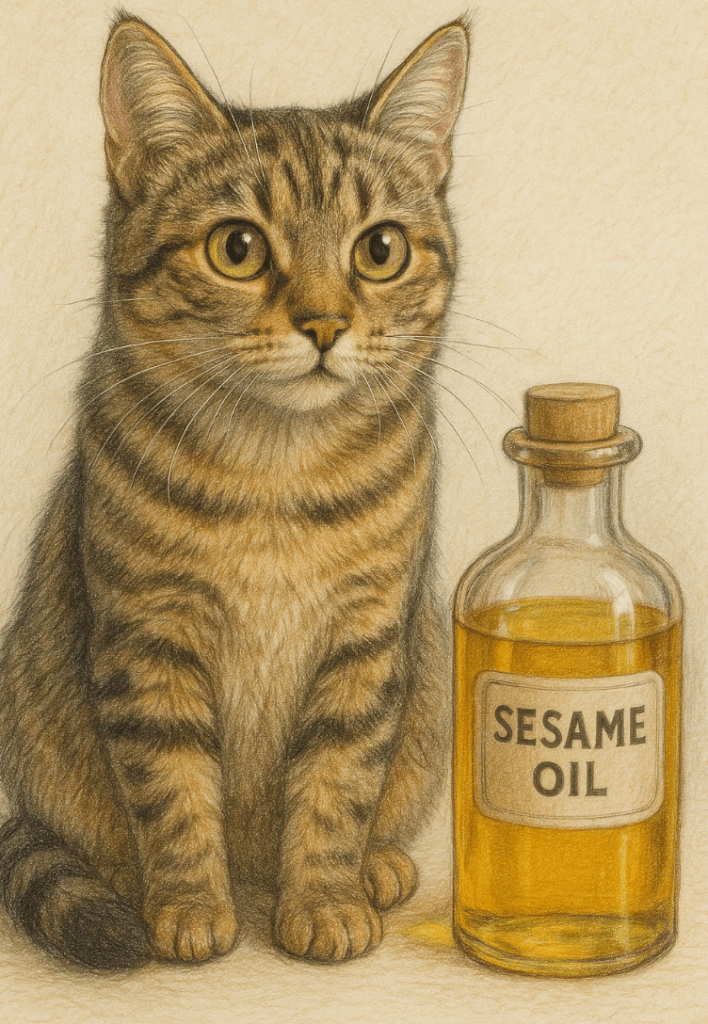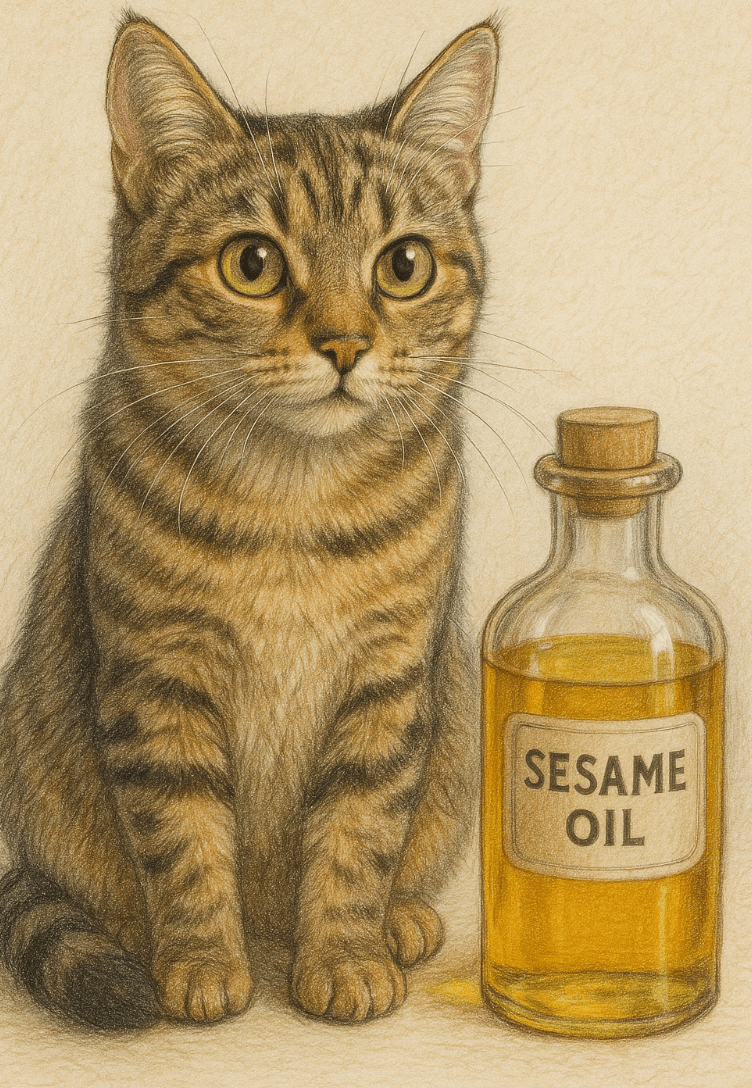Can Cats Eat Sesame Oil?
When it comes to our feline friends, we often wonder which human foods are safe for them to consume. One such question that arises is whether cats can eat sesame oil. While sesame oil is a popular ingredient in many dishes due to its nutty flavor and potential health benefits for humans, it’s important to consider how it might affect our pets. Cats have unique dietary needs and sensitivities, so understanding the impact of sesame oil on their health is crucial. In this blog post, we’ll explore whether sesame oil is safe for cats, its potential benefits, risks, and alternatives to keep your furry companion happy and healthy.
Potential Benefits of Sesame Oil for Cats
While sesame oil isn’t a staple in a cat’s diet, it does offer some potential benefits when used sparingly and under supervision. Here’s what you need to know about its positive effects.
Rich in Healthy Fats:
Sesame oil contains omega-6 fatty acids, which can support skin health and promote a shiny coat when consumed in moderation.Anti-Inflammatory Properties:
The antioxidants in sesame oil, such as sesamol, may help reduce inflammation, which could be beneficial for older cats with joint issues.Supports Digestive Health:
Small amounts of sesame oil might aid digestion by lubricating the digestive tract, potentially easing mild constipation.Natural Source of Vitamins:
Sesame oil contains vitamins E and K, which contribute to immune function and blood clotting, respectively.May Repel Pests (Externally):
When applied topically (in diluted form), sesame oil can act as a natural flea repellent due to its strong scent.
While these benefits exist, it’s essential to use sesame oil cautiously and only in small amounts to avoid adverse effects.
Risks of Feeding Sesame Oil to Cats
Despite its potential benefits, sesame oil poses certain risks that every cat owner should be aware of before introducing it into their pet’s diet.
High Fat Content:
Sesame oil is calorie-dense, and excessive consumption can lead to weight gain or pancreatitis in cats.Digestive Upset:
Cats’ digestive systems are not designed to process large amounts of oils, which can cause vomiting or diarrhea.Allergic Reactions:
Some cats may develop allergies or sensitivities to sesame oil, resulting in itching, swelling, or respiratory issues.Not a Complete Nutrient Source:
Sesame oil lacks essential nutrients like taurine, which cats require for heart and eye health, making it an incomplete food source.Risk of Over-Supplementation:
Adding too much oil to your cat’s diet can interfere with the absorption of other vital nutrients.
Understanding these risks ensures you make informed decisions about incorporating sesame oil into your cat’s routine.
Check this guide 👉Can Cats Eat Pastrami? Best 7 Expert Tips!
Check this guide 👉Can Cats Eat Gum? Best 7 Expert Tips!
Check this guide 👉Can Cats Eat Beef Fat? Best 7 Expert Tips!

Safe Uses of Sesame Oil for Cats | Unsafe Practices to Avoid |
|---|---|
Small amounts mixed with food | Feeding large quantities at once |
Topical application for pest control | Using undiluted oil on sensitive skin |
Occasional digestive aid | Replacing balanced meals with oil |
Anti-inflammatory benefits | Ignoring signs of allergic reactions |
Supporting coat health | Giving oil to cats with pancreatitis |
How to Safely Introduce Sesame Oil to Your Cat
If you decide to try sesame oil with your cat, it’s crucial to do so safely and responsibly. Follow these guidelines to minimize risks and ensure a positive experience.
Start with Tiny Amounts:
Begin with a drop or two mixed into their regular food to monitor their reaction.Choose Pure, Unrefined Oil:
Opt for high-quality, cold-pressed sesame oil without additives or preservatives.Monitor for Adverse Reactions:
Watch for signs of digestive upset, allergic reactions, or changes in behavior after feeding.Use Sparingly:
Limit sesame oil to occasional use rather than making it a regular part of their diet.Consult Your Veterinarian:
Always seek professional advice before introducing new foods or supplements to your cat’s diet.
By following these steps, you can safely experiment with sesame oil while prioritizing your cat’s well-being.
Signs Your Cat May Not Tolerate Sesame Oil
Even when introduced carefully, some cats may not tolerate sesame oil well. Recognizing these warning signs allows you to act quickly if something goes wrong.
Vomiting or Diarrhea:
These symptoms indicate that your cat’s digestive system is struggling to process the oil.Loss of Appetite:
A sudden refusal to eat could signal discomfort or an adverse reaction to sesame oil.Excessive Licking or Scratching:
This behavior often suggests an allergic reaction or irritation caused by the oil.Lethargy or Weakness:
If your cat seems unusually tired or unresponsive, it could be a sign of toxicity or nutrient imbalance.Difficulty Breathing:
In rare cases, sesame oil may trigger severe allergic reactions requiring immediate veterinary attention.
Being vigilant about these signs ensures your cat stays safe and healthy.
Alternatives to Sesame Oil for Cats
If you’re looking for safer ways to enhance your cat’s diet or address specific health concerns, consider these alternatives to sesame oil.
Fish Oil Supplements:
Rich in omega-3 fatty acids, fish oil supports skin, coat, and joint health without the risks associated with sesame oil.Pumpkin Puree:
A natural fiber source, pumpkin puree aids digestion and helps manage hairballs effectively.Coconut Oil (in Moderation):
Known for its antimicrobial properties, coconut oil can support skin health and digestion when used sparingly.Hydration Boosters:
Add water or low-sodium chicken broth to meals to encourage hydration and improve overall wellness.Veterinary-Approved Treats:
Specialized treats formulated for cats provide additional nutrients without compromising their health.
These alternatives ensure your cat receives the care they need without unnecessary risks.
Common Misconceptions About Feeding Oils to Cats
Feeding oils to cats is surrounded by myths that can lead to confusion among pet owners. Clarifying these misconceptions helps ensure proper care.
All Oils Are Safe for Cats:
Not all oils are created equal—some, like essential oils, are highly toxic to cats.Oils Can Replace Balanced Meals:
No oil can substitute the complete nutrition provided by high-quality cat food.More Oil Means Better Health:
Excessive oil intake can harm your cat’s health, leading to obesity or pancreatitis.Cats Need Human Supplements:
Cats have unique nutritional requirements that differ from humans, so not all human supplements are suitable for them.Topical Oils Solve All Skin Issues:
While topical oils may help with minor irritations, underlying conditions often require veterinary treatment.
Understanding these facts ensures you provide the best care for your cat.
Tips for Maintaining a Balanced Diet for Your Cat
A balanced diet is key to keeping your cat healthy and happy. These tips will help you ensure they receive the nutrients they need.
Stick to High-Quality Cat Food:
Choose commercially available foods labeled as “complete and balanced” to meet your cat’s dietary needs.Avoid Human Foods:
Many human foods, including oils, spices, and seasonings, can upset your cat’s stomach or pose health risks.Provide Fresh Water Daily:
Hydration is essential for kidney function and overall health; always keep clean water available.Limit Treats and Supplements:
Treats and oils should make up no more than 10% of your cat’s daily caloric intake.Schedule Regular Vet Check-Ups:
Routine veterinary visits help identify nutritional deficiencies or health issues early.
By following these guidelines, you can maintain a balanced diet that supports your cat’s long-term well-being.
Frequently Asked Questions About Cats and Sesame Oil
Is sesame oil toxic to cats?
No, sesame oil is not inherently toxic, but it should be used sparingly due to its high fat content and potential digestive effects.
Can kittens eat sesame oil?
Kittens have delicate digestive systems, so it’s best to avoid giving them sesame oil altogether.
How much sesame oil can I give my cat?
Limit intake to a drop or two per serving, and never exceed more than a teaspoon weekly.
Can sesame oil help with hairballs?
While it may lubricate the digestive tract slightly, it’s not a substitute for specialized hairball remedies.
What should I do if my cat accidentally ingests sesame oil?
Monitor your cat closely for any adverse reactions; contact your vet if symptoms persist or worsen.
Prioritizing Your Cat’s Health When It Comes to Sesame Oil
While sesame oil offers some potential benefits for cats, it’s not a necessity in their diet and should be approached with caution. Understanding its effects, both positive and negative, empowers you to make safe and informed choices for your feline friend. By using sesame oil sparingly and consulting your veterinarian, you can ensure your cat enjoys a balanced and nutritious diet. Remember, your cat relies on you to make the best decisions for their health—so always prioritize their well-being above all else.
Do Cats Have Taste Buds? Best 7 Expert Tips! – Discover how cats experience flavors and why their taste is so unique.
Do Dogs Have Taste Buds? Best 7 Expert Tips! – Discover how dogs experience taste, their preferences, and what it means for their diet and health.
Can Cats Taste Sweet? Best 7 Expert Tips! – Discover why cats can’t taste sweetness, how it affects their diet, and tips to keep them healthy and happy.
Can Dogs Taste Sweet? Best 7 Expert Tips! – Discover how dogs perceive sweetness, which foods are safe, and tips to manage their sweet cravings responsibly.





